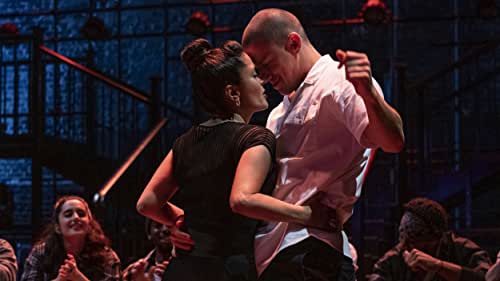The real enjoyment to be found at the core of the “Magic Mike” series was never really in its erotic dance sequences and wine-mom eye candy, but in how the films manage to underscore its fluffy premise by imbuing the characters with genuine heart and remarkable complexity.
The original “Magic Mike” was a surprisingly gritty tale of post-recession hustle and the drive to escape the eerily cold and commodifying profession of stripping with one’s dignity intact. It’s sequel, “XXL” switched lanes into a pure sugar high, a bro-empowerment tale for the ages that reveled in its lack of stakes and relentlessly positive masculine energy. Both are punctuated by fantastically choreographed dance numbers sprinkled throughout.
“Magic Mike’s Last Dance,” director Steven Soderbergh once again tries to change things up, this time by having the film center on a romance between the titular Mike, played by Channing Tatum and Maxandra, a wealthy socialite played by Salma Hayek who recruits Mike to London in order to transform a stuffy theater production into something a little more steamy as a means of getting back at her cheating husband.
While the setup sounds promising enough, nearly every aspect of the movie quickly falls apart into a dreary slog, chiefly due to a complete lack of chemistry between our two leads that dooms any believability in the two’s love affair. Tatum and Hayek play their respective roles well enough, but the two together end up feeling like a half-baked middle school courtship. Both comes off as largely disinterested in the other, as if they’re only entertaining romance because the script told them to.
The setting change also does little to ease the film’s pains. The series’ previous entries found its characters inhabiting the charmingly greasy drag bars, sun-drenched beaches and sweaty nightclubs of Florida and the American South. Moving to London in “Last Dance” brings an overcast color palette and old-money venues that only betray the seedy appeal of previous entries. The fish-out-of-water aspect of the setting feels completely underutilized as well, with only a choice few lines establishing how Mike is (supposedly) out of his element across the Atlantic.
The film is further bogged down due to bizarre plot decisions. Why is a significant amount of screen time dedicated to a conflict involving British building code laws? Why does Max’s estranged husband (a key plot component) only appear on screen for maybe thirty seconds? Why is there hardly any dancing save for the bookends of the film? How could a movie about male strippers possibly be so unbelievably boring?
Even the two aforementioned dance sequences towards the beginning and end of the film are lackluster. The choreography still delights, but Soderbergh’s more distant and icy style, which worked to great effect in the more downtrodden first film, only serves to make the scenes feel sterile. Combine that with the finale dance taking place in a haughty old theater (where the dancers are not to be touched,) and the intensity and rawness that had made the previous films’ dance sequences so intoxicating is lost.
Perhaps the film’s greatest fault is its mistreatment of its characters, both old and new. Mike’s admirable grind and ambition is gone, replaced with a surrendering of agency to his affluent sponsor. Max also meanders, achieving a miniscule amount of development by the end of the film but only after spending most of it bumbling through the other characters’ lives and the boring divorce plotline.
Those other characters are also barely there. Ayub Khan-Din plays Max’s butler, existing only to deliver some tired jokes and occasionally be a voice of reason to Max’s diva antics. Max’s daughter, Zadie, played by Jemelia George is criminally underutilized, mostly acting as an unseen narrator attempting to give the movie a fairytale façade. However, it doesn’t really work.
Most painful to fans of the series, the ensemble from “XXL” is replaced instead by an army of nameless dancers enlisted by Mike to serve only as an attractive set of abs, a far cry from the care with which dignity and nuance was provided to the stripper characters in the previous films. The camaraderie is also missing, with Mike and his mob sharing none of the impactful bro-moments that made “XXL” such a good time.
I can appreciate the direction “Last Dance” attempts to go in in order to keep things fresh, so it’s a shame it stumbles so hard. Gone are the sly, subversive levels of character drama and diaphoretic dance gloriousness of “Magic Mike” past, replaced by a limping love story and a frustratingly little amount of fun.
Matthew Catalano can be reached at [email protected].



















